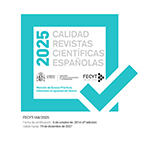The Treaty of Lisbon and the gender–blind responses to the EU crises: impact on the quality of European democracy
Resumen
Este artículo analiza el estado de la democracia en la Unión Europea (UE) aplicando el enfoque de género sobre el Tratado de Lisboa y tres de las principales crisis europeas en la primera década desde su entrada en vigor (2009-2019): la crisis económica (2008-2014); Brexit (2017-2020) y el declive democrático y activación del artículo 7 del TUE contra Polonia y Hungría (2017 y 2018, respectivamente). Basándose en teoría de la democracia feminista, muestra las conexiones de interdependencia de la democracia y la igualdad de género en las crisis europeas analizadas. Examina las dos dimensiones del doble déficit democrático con perspectiva de género –la infrarrepresentación de las mujeres y la sensibilidad de género– en la adopción y disposiciones del Tratado de Lisboa y la toma de decisiones y respuestas europeas a las crisis. Este artículo sostiene que las respuestas europeas a las crisis de la primera década del Tratado de Lisboa carecen de perspectiva de género y que ello ha contribuido, entre otros factores, al deterioro de las estructuras y procedimientos democráticos de la UE y, a su vez, también ha contribuido a frenar el progreso en igualdad de género y exacerbar la desigualdad de género en diferentes estados miembros. Dados los planes de Ursula Von der Leyen para un “nuevo impulso a la democracia europea”, y la nueva crisis por la pandemia del virus Covid-19, el artículo señala algunos aspectos de género claves que deberían considerarse para el futuro del proyecto democrático europeo.
Descargas
Descarga artículo
Licencia
La revista Política y Sociedad, para fomentar el intercambio global del conocimiento, facilita el acceso sin restricciones a sus contenidos desde el momento de su publicación en la presente edición electrónica, y por eso es una revista de acceso abierto. Los originales publicados en esta revista son propiedad de la Universidad Complutense de Madrid y es obligatorio citar su procedencia en cualquier reproducción total o parcial. Todos los contenidos se distribuyen bajo una licencia de uso y distribución Creative Commons Reconocimiento 4.0 (CC BY 4.0). Esta circunstancia ha de hacerse constar expresamente de esta forma cuando sea necesario. Puede consultar la versión informativa y el texto legal de la licencia.











